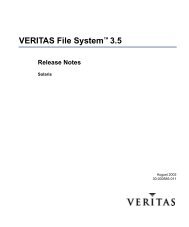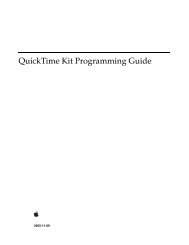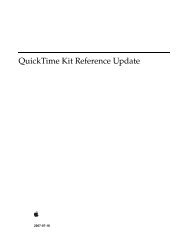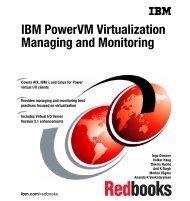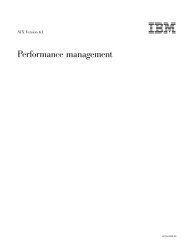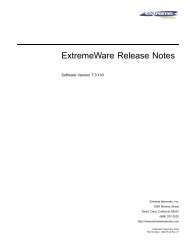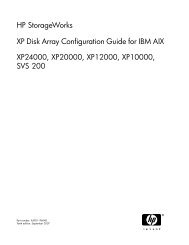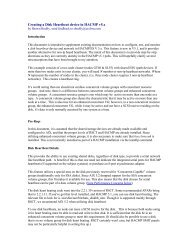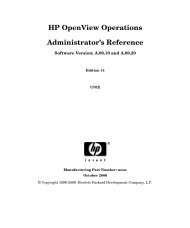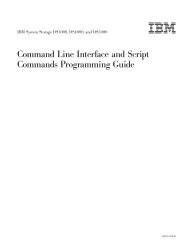HP-UX VxFS tuning and performance - filibeto.org
HP-UX VxFS tuning and performance - filibeto.org
HP-UX VxFS tuning and performance - filibeto.org
Create successful ePaper yourself
Turn your PDF publications into a flip-book with our unique Google optimized e-Paper software.
Using datainlog has no affect on normal asynchronous writes or synchronous writes performed with<br />
direct I/O. The option nodatainlog is the default for systems without <strong>HP</strong> OnlineJFS, while datainlog is<br />
the default for systems that do have <strong>HP</strong> OnlineJFS.<br />
mincache<br />
By default, I/O operations are cached in memory using the <strong>HP</strong>-<strong>UX</strong> buffer cache or Unified File Cache<br />
(UFC), which allows for asynchronous operations such as read ahead <strong>and</strong> flush behind. The mincache<br />
options convert cached asynchronous operations so they behave differently. Normal synchronous<br />
operations are not affected.<br />
The mincache option closesync flushes a file‟s dirty buffers/pages when the file is closed. The close()<br />
system call may experience some delays while the dirty data is flushed, but the integrity of closed files<br />
would not be compromised by a system crash.<br />
The mincache option dsync converts asynchronous I/O to synchronous I/O. For best <strong>performance</strong> the<br />
mincache=dsync option should not be used. This option should be used if the data must be on disk<br />
when write() system call returns.<br />
The mincache options direct <strong>and</strong> unbuffered are similar to the dsync option, but all I/Os are<br />
converted to direct I/O. For best <strong>performance</strong>, mincache=direct should not be used unless I/O is<br />
large <strong>and</strong> expected to be accessed only once, or synchronous I/O is desired. All direct I/O is<br />
synchronous <strong>and</strong> read ahead <strong>and</strong> flush behind are not performed.<br />
The mincache option tmpcache provides the best <strong>performance</strong>, but less data integrity in the event of a<br />
system crash. The tmpcache option does not flush a file‟s buffers when it is closed, so a risk exists of<br />
losing data or getting garbage data in a file if the data is not flushed to disk in the event of a system<br />
crash.<br />
All the mincache options except for closesync require the <strong>HP</strong> OnlineJFS product when using <strong>VxFS</strong> 5.0<br />
or earlier. The closesync <strong>and</strong> direct options are available with the Base JFS product on <strong>VxFS</strong> 5.0.1<br />
<strong>and</strong> above.<br />
convosync<br />
Applications can implement synchronous I/O by specifying the O_SYNC or O_DSYNC flags during<br />
the open() system call. The convosync options convert synchronous operations so they behave<br />
differently. Normal asynchronous operations are not affected when using the convosync mount option.<br />
The convosync option closesync converts O_SYNC operations to be asynchronous operations. The<br />
file‟s dirty buffers/pages are then flushed when the file is closed. While this option speeds up<br />
applications that use O_SYNC, it may be harmful for applications that rely on data to be written to<br />
disk before the write() system call completes.<br />
The convosync option delay converts all O_SYNC operations to be asynchronous. This option is<br />
similar to convosync=closesync except that the file‟s buffers/pages are not flushed when the file is<br />
closed. While this option will improve <strong>performance</strong>, applications that rely on the O_SYNC behavior<br />
may fail after a system crash.<br />
The convosync option dsync converts O_SYNC operations to O_DSYNC operations. Data writes will<br />
continue to be synchronous, but the associated inode time updates will be performed asynchronously.<br />
The convosync options direct <strong>and</strong> unbuffered cause O_SYNC <strong>and</strong> O_DSYNC operations to bypass<br />
buffer/file cache <strong>and</strong> perform direct I/O. These options are similar to the dsync option as the inode<br />
time update will be delayed.<br />
All of the convosync options require the <strong>HP</strong> OnlineJFS product when using <strong>VxFS</strong> 5.0 or earlier. The<br />
direct option is available with the Base JFS product on <strong>VxFS</strong> 5.0.1.<br />
21



